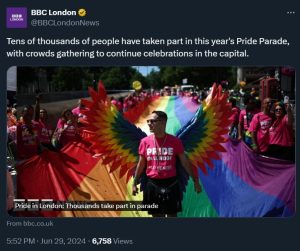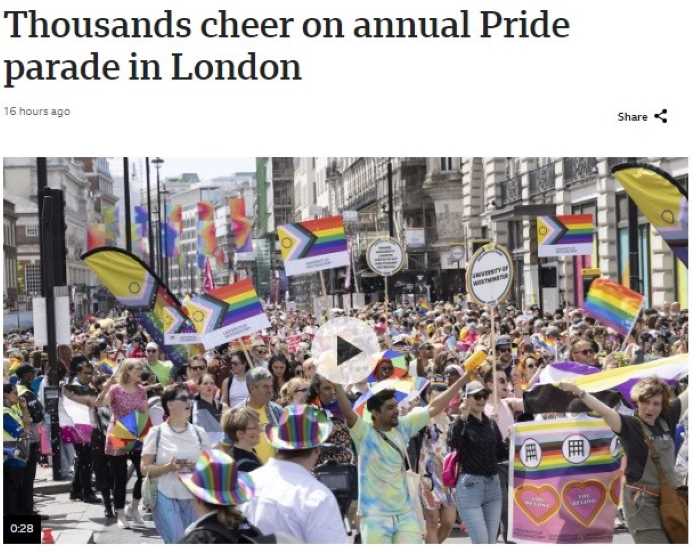On June 29th the BBC News website published a report which later underwent amendments and is now titled “Thousands cheer on annual Pride parade in London”. Originally stated to have been written by BBC London’s Liz Jackson and PA Media, the report’s current version is uncredited, stating at the bottom “Additional reporting by PA news agency”.
The report opens:
“Giant peacock floats, motorbike formations and martial arts demonstrations accompanied by thumping pop tunes have formed part of London’s annual Pride Parade this year.
Attendees in the colourful procession wore all kinds of outfits ranging from carnival costumes to gym gear, while crowds lined the streets from Hyde Park to Trafalgar Square to cheer them on as a giant rainbow Pride flag was carried through central London.
Organised by not-for-profit Pride in London, an estimated 500 LGBTQ+ community groups and businesses took part, comprising more than 32,000 people.”
The original version of the report did not inform readers that a Jewish charity had cancelled its participation due to safety fears. A later version told readers that:
“It comes amid reports in The Sunday Telegraph that parade participants from Jewish organisations KeshetUK and West London Synagogue pulled out of the parade over concerns they would be harassed while on the route.
KeshetUK, West London Synagogue and the Met Police have been contacted for a response.”
That paywalled Sunday Telegraph report includes details which the BBC apparently did not find newsworthy:
“A coalition of pro-Palestinian groups was planning to target organisations along the route which it believed were “complicit in the ongoing genocide” in Gaza, The Telegraph can disclose.”
The version of the report currently available online includes the following:
“It comes amid reports in The Sunday Telegraph that parade participants from Jewish organisations KeshetUK and West London Synagogue pulled out of the parade over concerns they would be harassed while on the route.
KeshetUK and the West London Synagogue have been contacted for a response.
Pride in London said: “It saddens us that KeshetUK and West London Synagogue were not among the groups marching in the Pride in London Parade this year.
“We strived to make them, and all those marching, feel as safe as possible with our extensive safety and security measures, though we understand that everyone must make their own risk assessments, and celebrate and commemorate Pride in the way that is right for them.”
The not-for-profit organisation also said its aim was to be a welcoming community for everyone in London’s LGBTQ+ communities.”
Six paragraphs later the BBC’s report states:
“The Metropolitan Police said on Saturday it had arrested 33 individuals in Westminster on suspicion of conspiracy to cause a public nuisance.”
The Telegraph reported that those “individuals” were “pro-Palestinian activists”.
All versions of the BBC’s report include the following:
“Marchers from the group Queers for Palestine also walked down Piccadilly, chanting “there is no pride in genocide”.
The 50-person group held posters accusing Israel of genocide and condemning “pinkwashing” – the accusation that Israel takes a progressive position on gay rights to improve its international reputation.
The Israeli embassy has been contacted for a response.
Asked why she wanted to join the group, one female marcher who did not want to be identified said: “Free Palestine.”
Waving a big flag, Arman Khan, who did not want to give their age, said they were against pinkwashing.”
The BBC’s report makes no effort whatsoever to inform readers of the redundancy of the accusations of genocide or the discrimination and exclusion that lie behind the ‘pinkwashing’ smear. As observed by James Kirchick when the employment of that term began thirteen years ago:
“Introducing the term “pinkwashing” into the mainstream debate about the Arab-Israeli conflict is edifying in at least one respect: It lays bare the delusion, paranoia, and cynicism of the Jewish state’s most earnest detractors. In their minds, any positive statement made about the country is necessarily part of a propaganda campaign in the service of a far-right agenda. For an increasingly large swath of the international left, there really is no good Israel can do, short of disappear.”
The BBC’s report continues with another quote from Arman Khan: [emphasis added]
“Asked what they made of criticisms that Queers For Palestine ignore the limited gay rights within Palestinian society, they said: “I can’t speak because I’m not from there, but you have to be in a privileged position to ask that question.”
They said the group was getting a positive response from the crowd.
Tahir Kesai, a 50-year-old working in property, said: “We decided to march because we think it’s important to be here. We’re too passionate about this cause to not participate.””
The BBC’s report makes no effort whatsoever to address that ridiculous “privileged position” claim or to inform readers what it means by “limited gay rights within Palestinian society”. BBC audiences are not informed that in fact members of that community face severe persecution – including execution – both in the Gaza Strip and the Palestinian Authority controlled areas.
Given the BBC’s record of very limited reporting on internal Palestinian affairs in general and LGBT+ rights in particular, it is unlikely that those getting their news from a media organisation which just a year ago censored a Hamas statement concerning the Jerusalem pride parade would be sufficiently informed on the issue of the lack of rights for gay Palestinians to be able to fill in for themselves the many blanks left by this BBC report.
The section quoting and promoting ‘Queers for Palestine’ is the only part of this report that promotes a political agenda, with other featured groups being a motorcycle club and a basketball club. Notably, BBC London chose to amplify smears such as ‘genocide’ and ‘pinkwashing’ without providing its readers with context essential for proper understanding of the story and the agenda of those promoting such baseless allegations.
Related Articles:




